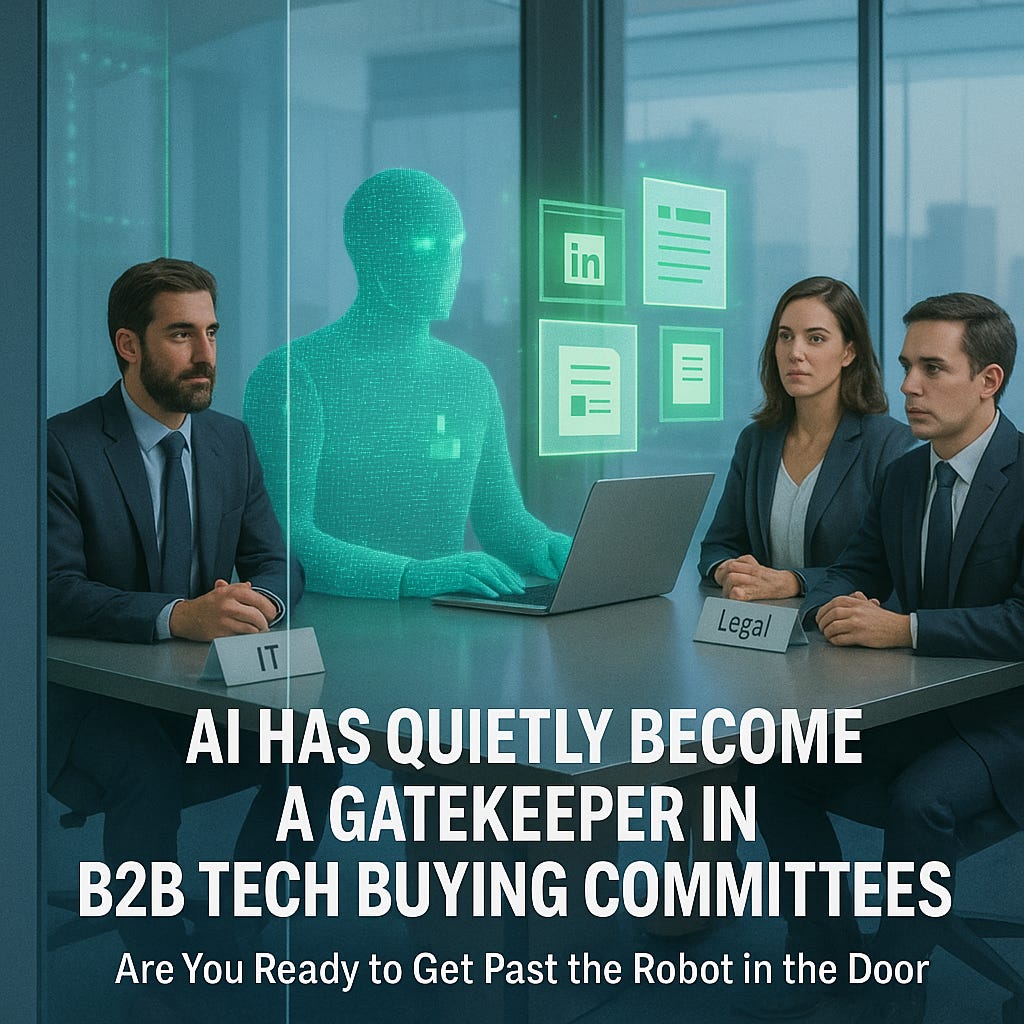AI Has Quietly Become a Gatekeeper in the B2B Tech Buying Committee- Are You Ready?
Glasp’s Note: At Glasp, we value the close personal relationships we’ve built with thinkers, creators, and doers who fuel curiosity and growth. This week, we spotlight Noa Eshed, an award-winning growth marketer, podcaster, and Amazon best-selling author. Noa is the Co-founder and General Manager of Bold Digital Architects, a leading agency specializing in content marketing for B2B tech startups.
You may remember Noa from her Glasp Talk appearance, where she shared deep insights into B2B marketing. We’re honored to keep learning from her and excited to share her thoughtful reflections with our community.
You’re crafting the perfect case study.
You’re refining your messaging for a product launch.
You’re publishing a white paper that took your team two months to develop.
But the first set of eyes on it may not belong to your target buyer.
They may not belong to a human at all.
In the B2B tech world, something big (and subtle) is underway.
AI agents are quietly scanning your brand, sometimes before any human ever does, and deciding whether or not it's worth a closer look.
And in doing so, they’ve become gatekeepers to everything you’ve been working on.
The Machines at the Table
Every B2B buyer journey has always included a mix of stakeholders.
IT. Finance. Legal. End-users.
But now there’s another participant: AI.
It doesn’t ask questions on Zoom calls. It doesn’t show up in CRMs. But it is changing the very game.
AI agents crawl your website, your LinkedIn, your blog, and your press mentions.
They ingest everything. Then they summarize, rank, categorize, and decide what information gets passed along to the humans making the final call.
That process happens in the background. You’ll never get a calendar invite from an AI assistant (OK, maybe you will, but we’re not there yet).
In any case, the influence is real and growing.
It’s not news that SEO and algorithms affect visibility.
What’s changed is that AI agents are no longer passive filters.
They’re active participants.
Some are embedded in enterprise research tools.
Others power generative AI search engines.
Some are simply autonomous LLMs asked to find a shortlist of vendors.
They’re not buying - but they are curating.
And if you’re not on their radar, your brand might not make it to the human discussion.
Two Games Are Being Played
Let’s break it down.
The 3%: These are buyers in the market now, actively looking for solutions. Increasingly, AI agents are part of the early discovery process. That’s where structured clarity becomes key. Pricing. Product specs. Competitive comparisons. Use cases. Implementation timelines. Case studies. The more accessible and well-structured this information is, the more likely it is to be surfaced (by both machines and humans)
This doesn’t represent a radical shift - it’s more of an acceleration of what marketing was already moving toward. People want clarity. Machines just enforce that preference more rigorously. Making your information machine-readable is simply another way to make it human-friendly.
The 97%: The rest of your audience isn’t buying today, but they’re forming impressions. AI is helping shape those impressions by running sentiment analysis, ranking authority, and subtly determining which brands feel relevant and trusted. Even ambient brand awareness is now AI-mediated. AI assistants and research bots analyze tone, consistency, thought leadership, and digital footprint. On top of being top of mind with people, the visibility layer is now about being trusted and recognizable by machines as well.
More than ever, emotional decisions now come with algorithmic context. If the bots don’t trust you, the humans might not even know you exist.
Yes, that was true concerning SERPS since. Well, forever, but now there's a bigger buffer to get in front of humans.
Getting Past The Robot At The Door
Robots don’t care about your brand’s vibe.
They’re not impressed by clever headlines or emotional hooks.
They care about structure. Clarity. Authority. Consistency. Facts.
AI systems reward content that’s organized, labeled, and reinforced with credibility signals.
That includes schema markup, structured metadata, citations, and consistent messaging across your digital footprint.
They analyze sentiment at scale, tracking tone, confidence, and even topical consistency.
But here’s the thing: none of this is fundamentally new.
The shift isn’t in what works; it’s in how visible your efforts now are.
For years, winning in organic search has required E-A-T: expertise, authoritativeness, and trustworthiness.
That hasn’t changed.
What’s changed is that this logic is no longer confined to search engines.
It now spans across AI assistants, summarization tools, and internal procurement bots - all of which scan for these same signals.
So while it may feel like we’re now marketing to machines, the truth is we’ve been preparing for this moment all along.
Clear, structured, trustworthy content has always served people.
The difference now is that for many more of the use cases, machines are the ones deciding if people ever see it.
What You Should Actually Do
Start with the foundation that’s always mattered: domain expertise, trust, and consistency.
Those are still the things that win - AI just makes them more visible (or not).
Then, layer in the technical hygiene:
Make your content accessible to both humans and machines:
Structure your site and pages clearly, using headers, lists, and clean formatting.
Publish transparent, up-to-date details - pricing, specs, case studies, use cases, comparisons.
Implement structured data where it matters (products, reviews, FAQs, authorship).
Earn visibility where AI agents + humans look for consensus and credibility:
Publish bylined articles in trusted publications.
Show up in relevant industry listicles and curated rankings.
Engage authentically in communities, forums, and comment threads on platforms like LinkedIn, Reddit, and Slack groups.
Ensure alignment across your digital presence:
Keep your tone, claims, and positioning consistent across your site, blog, social, and earned media.
Maintain an authoritative and current digital footprint.
This isn’t about gaming the system. It’s about building a digital presence that reflects what great marketing has always been about: being clear, being helpful, and showing up where it matters.
The Bottom Line
AI hasn’t replaced human decision-making, but it’s increasingly reshaping who gets considered in the first place.
It’s not (always) the buyer you need to impress first - it’s their assistant, their research tool, their summarizer.
The brands that win won’t be the ones who hack the system.
They’ll be the ones who understand it - and adapt with clarity, consistency, and credibility.
AI is already scanning. Already deciding. Already filtering.
Make sure it knows what to find.
📣 Community Updates by Glasp
🟥 Glasp Talk with Noa Eshed:
Glasp Talk features intimate interviews with luminaries who reveal their emotions, experiences, and stories. The guest, Noa Eshed, is an award-winning growth marketer, podcaster, and Amazon best-selling author. Noa is the co-founder and General Manager of Bold Digital Architects, a leading agency specializing in content marketing for B2B tech startups.🟦 Audio Transcription Milestone, 30,000+:
We’re thrilled to announce that Glasp has generated over 30,000 audio transcriptions! From lectures and podcasts to YouTube videos and interviews, our AI-powered tool makes it effortless to turn any audio into searchable, highlightable text. If you haven’t tried it yet, give it a try here.
Would you like to take Glasp on the go?
With the Glasp mobile app, you can highlight and organize your favorite content anytime, anywhere. Stay productive on the move and never miss an insightful quote.
Partner With Glasp
We currently offer newsletter sponsorships. If you have a product, event, or service you’d like to share with our community of learning enthusiasts, sponsor an edition of our newsletter to reach engaged readers.






This was a powerful wake-up call. The idea that AI is already acting as a gatekeeper before human eyes even land on content really shifts how we need to think about visibility and trust.
It’s not just about SEO anymore. It’s about building clarity and credibility into everything we publish, for both humans and machines.
Great reminder that the fundamentals of good marketing haven’t changed. Thanks for this insightful piece!
Thank you so much for the great post and spotlighting this topic, Noa!
AI could change the way sales are conducted. So, it's a must-read article for B2B sales professionals, marketers, and founders.